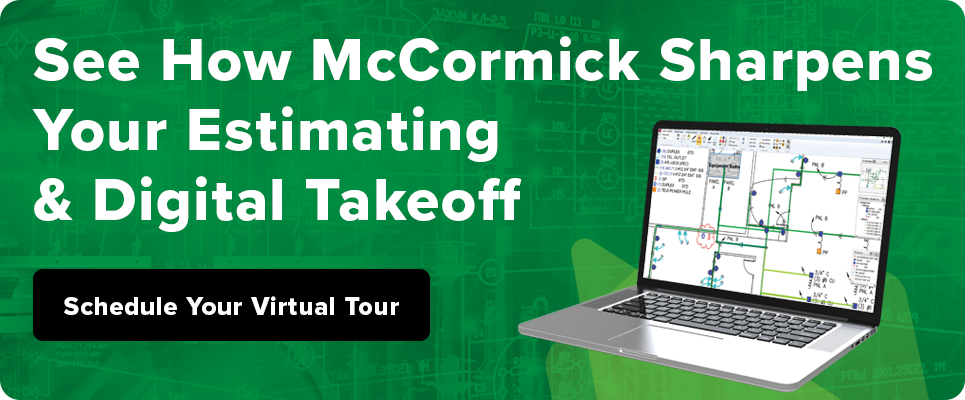
by Paul Wheaton
June 28, 2024
One of the most important steps to winning more lucrative electrical jobs is cultivating successful estimating habits. These habits should make creating fast, accurate bids a seamless process.
Below, we’ve put together 10 different things to consider as you cultivate better estimating habits. If you’re new to estimating, or just trying to sharpen your processes, pick a few adjustments to start with then continue adding to the routine over time. As one habit becomes engrained, move to the next. Soon, both your bids will have that competitive edge.
Key Takeaways for Electrical Estimators:
- Successful electrical estimators commit to building habits centered around precision, time management, collaboration, and communication.
- Good electrical estimators always keep the project scope in mind throughout the estimating process.
- Identifying pitfalls and building good habits are crucial to the long-term success of an electrical contractor.
- Construction estimating software helps estimators build accurate estimates quickly while reinforcing good habits.
What Makes a Good Electrical Estimator?
Successful electrical estimators rely on creating habits focused on precision, time management, collaboration, and communication to create competitive electrical estimates. These habits include:
1. Paying Attention to Project Scope
Successful electrical estimators understand that every project has its own goals, and every owner has their specific demands. While building the most accurate estimate possible, it’s crucial that the estimator constantly references the intended scope as they determine materials, quantities, costs, and timelines. Otherwise, they may miss crucial elements or add unnecessary expenses, eliminating them from consideration during the bidding process.
2. Focusing on Efficiency
Bidding is an incredibly competitive process that relies on speed and accuracy. A good estimator can build winning bids quickly by running takeoff and building efficient estimates and then submitting their bid in a timely manner.
One way to increase your bidding speed is by using electrical estimating software that has built-in takeoff. As you make your measurements and identify the materials, prices are automatically added to the estimate, cutting multiple steps out of your process.
Also, properly allocating the time of others is one of the most important elements of building an estimate. If you’re able to do this consistently, you can effectively control labor costs, take on more projects simultaneously, and maximize productivity and profitability.
3. Being Precise When Building the Estimate
Depending on the job, project owners may comb through hundreds of electrical bids so even one mistake or inconsistency could mean you’re out of consideration.
Building precise estimates involves paying close attention to measurements, calculations, labor costs, and resource availability. It also means verifying this information again before submitting your bid to avoid mistakes and scheduling conflicts.
4. Adapting to Changes
The construction industry is dynamic; circumstances shift all the time. And that holds true for electrical estimating. For example, perhaps you included a particular group of more experienced electricians in the labor cost breakdown. But you’ve received an update stating their new schedule conflicts with that of this potential project. So now you must rely on a different group of electricians to get the job done.
For visibility, these changes need to be adjusted in the timeline and labor costs before the bid is submitted. But good estimators are nimble, meaning they can modify their approach based on multiple factors in real-time. They’ve got multiple go-to suppliers and a range of material options in their back pocket to adjust quickly.
5. Using Resources to Adhere to Electrical Codes and Regulations
Electrical codes can vary by state and local jurisdictions, so it’s important electrical estimators are aware of the resources available to them. Good estimators always keep electrical codes and regulations in mind so they can build accurate estimates while avoiding costly compliance fines.
6. Being Willing to Collaborate
Before building their cost estimate, a good estimator may contact the project owner to learn more about their expectations, check resources and suppliers for availability and gather references from previous estimates.
Then as they build the estimate, it’s crucial for an electrical estimator to communicate with project managers, project owners and other stakeholders about project needs and costs. By keeping an open line of communication, electrical estimators can stay ahead of changes and avoid mistakes that can impact the expected profitability of a job.
7. Always Desiring to Learn More
There are always new developments in the electrical industry. There may be changes to electrical codes or a new software solution that simplifies estimating. And many software offer classes to enhance their users experiences.
Electrical estimators who embrace the learning process are more likely to be successful because they are always looking for ways to improve.
8. Organizing Project Information Appropriately
Developing a system to organize project information where you can easily reference it is critical to creating fast, precise estimates. It also helps you compare actual costs to your estimate during the project. This is made significantly easier by using an electrical estimating software that integrates with an accounting software.
9. Reassessing Past Performance
Analyzing prior project experiences can help you avoid mistakes, apply the most productive processes, and maximize productivity and profitability. Some projects may have similar layouts or materials, such as wiring or fixtures. Identifying these similarities allows estimators to draw on past experiences, which saves time and helps them build more precise estimates.
10. Leveraging Electrical Estimating Software
Electrical estimating software — like McCormick — makes developing these habits much easier because it gives you access to trade-specific features to accurately calculate estimates, increase visibility, analyze past projects, source high-quality material, and more.
How Can You Start Building Successful Estimating Habits?
The first step to building strong electrical estimating habits is by determining where you can improve the most. You can do this by examining your current electrical estimating process. Ask yourself, “Are there any common mistakes or pitfalls I’ve noticed when creating estimates?”
Some examples of potential pitfalls include:
- Over/underestimating
- Consistently providing incorrect labor costs
- Being slow to adapt to changes provided by the project owner
Once you’ve identified these issues, begin applying the applicable habit(s) that align with your current pitfall(s). These habits are significantly easier to develop if you utilize electrical estimating software.
How Can You Build Estimating Habits Using Construction Estimating Software?
While habits can’t all change instantly, electrical estimating software gives you the tools to identify your weakest areas and work to improve them. Additionally, construction estimating software gives you greater visibility into project costs, automates measurements and calculations, securely stores project information and allows you to easily reassess past performance to determine areas of improvement.
Invest in trade-specific software like McCormick to ensure you receive features that are built for your projects so you can start applying these habits to maintain long-term success.
Share Article


